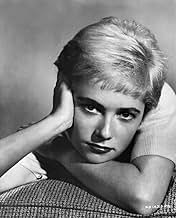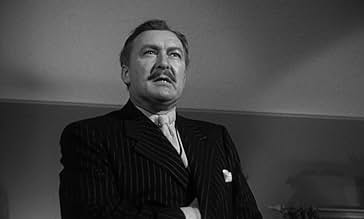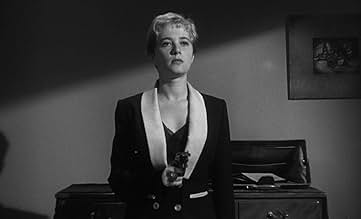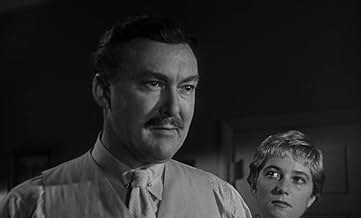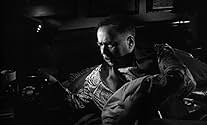IMDb रेटिंग
7.5/10
23 हज़ार
आपकी रेटिंग
अपनी भाषा में प्लॉट जोड़ेंA doomed female hitchhiker pulls Mike Hammer into a deadly whirlpool of intrigue, revolving around a mysterious "great whatsit".A doomed female hitchhiker pulls Mike Hammer into a deadly whirlpool of intrigue, revolving around a mysterious "great whatsit".A doomed female hitchhiker pulls Mike Hammer into a deadly whirlpool of intrigue, revolving around a mysterious "great whatsit".
- पुरस्कार
- 1 जीत और कुल 1 नामांकन
Marian Carr
- Friday
- (as Marion Carr)
Mady Comfort
- Nightclub Singer
- (as Madi Comfort)
फ़ीचर्ड समीक्षाएं
10Don-102
Kiss Me Deadly is an absolute joy to watch. There are no big-name stars, the director has never been mentioned in the same breath as a Hitchcock or Huston, and it's basically a simple Mickey Spillane story. How its presented on the screen is the genius of the picture. Right from the opening credit sequence, you know you're in for something fresh and innovative. This is a must see for fans of Quentin Tarantino, and there is a curious box containing a certain substance that glows when opened (Pulp Fiction, anyone?). It is one of the finest of the "film noir" genre, predominantly because of the moody black and white photography and its amazing 'timeless' appeal (I would rank it alongside Touch of Evil). It's great to know the film has been "rediscovered", and be sure to see a copy of the film containing 2 different versions of the mind-boggling final sequence shot at the time.
'Kiss Me Deadly' is an overlooked crime gem that has proved to be a major influence on subsequent film makers from the French New Wave to cult classics 'Repo Man' and 'Pulp Fiction'. It's a movie which gets better and better with age. Director Robert Aldrich manages to put lots of style and interesting touches which sometimes border on the surreal into this toughest of tough guy movies. Ralph Meeker ('Paths Of Glory', 'The Dirty Dozen', 'The Anderson Tapes') is well cast as Mickey Spillane's Mike Hammer. Meeker's Hammer is brutal and his performance really makes this one work. The supporting cast are all very good too, especially Albert Dekker ('The Wild Bunch') as Dr Soberin and Maxine Cooper as Hammer's "assistant" Velda. Also keep an eye out for the debut of Cloris Leachman is the striking opening sequence. The "great whatsit" which Hammer searches for is one of the great movie gimmicks, and the ending will blow you away - literally. I loved this movie from beginning to end. I think it ranks alongside 'Out Of The Past' (Tourneur), 'The Asphalt Jungle' (Huston), 'Double Indemnity' (Wilder), 'The Killing' (Kubrick) and 'The Killers (Siegel)' as one of the greatest and most influential American crime movies, and I'm sure Scorcese and Tarantino would be the first to agree. Highly recommended.
If The Maltese Falcon (1941) was the definitive true detective movie, The Big Sleep (1946) the definitive glamourized detective movie, and Chinatown (1974) the definitive allegorical detective movie, then Kiss Me Deadly is the definitive sleazy detective movie.
Mickey Spillane's sadistic private eye Mike Hammer, turned from successful private eye to sleazy bedroom dick, is the quintessential anti-hero, doing just about anything and everything wrong to get a piece of the pie that the characters call "The Big What's-it."
The movie survives by giving the usual Spillane buckets-of-blood story and its protagonist new dimensions. Right from the electric opening scene and the audacious opening credit sequence, the audience is drawn into Hammer's seedy world, where morality is suspended, and the credo of the end justifying the means dominates Hammer's actions. His reckless abandonment is almost never questionned and the film seems to understand his brutality as what he must do to get the job done in an equally brutal world.
Director Robert Aldrich observes all of it with an objective eye that neither glorifies nor condemns the action on-screen, letting the audience draw its own conclusions--even where the plot is concerned. The pace is unrelentless and the plot turns are never fully explained, forcing the audience to participate willingly in all that Hammer does to, hopefully, see the story through to its ending.
And what an ending! I'd de damned to a special place in Hell if I elaborated, so I'll just say that it's one of the greatest I've ever seen. That goes same for the movie itself, which is one of the most stylish, jarring and truly entertaining movies of its genre.
Mickey Spillane's sadistic private eye Mike Hammer, turned from successful private eye to sleazy bedroom dick, is the quintessential anti-hero, doing just about anything and everything wrong to get a piece of the pie that the characters call "The Big What's-it."
The movie survives by giving the usual Spillane buckets-of-blood story and its protagonist new dimensions. Right from the electric opening scene and the audacious opening credit sequence, the audience is drawn into Hammer's seedy world, where morality is suspended, and the credo of the end justifying the means dominates Hammer's actions. His reckless abandonment is almost never questionned and the film seems to understand his brutality as what he must do to get the job done in an equally brutal world.
Director Robert Aldrich observes all of it with an objective eye that neither glorifies nor condemns the action on-screen, letting the audience draw its own conclusions--even where the plot is concerned. The pace is unrelentless and the plot turns are never fully explained, forcing the audience to participate willingly in all that Hammer does to, hopefully, see the story through to its ending.
And what an ending! I'd de damned to a special place in Hell if I elaborated, so I'll just say that it's one of the greatest I've ever seen. That goes same for the movie itself, which is one of the most stylish, jarring and truly entertaining movies of its genre.
So the big what'sit is what it's all about and this big what'sit is without a doubt, flat out phenomenal. Ralph Meeker snarls and sneers his way thru a bevy of sadism and selfishness in this superb, unflinching look at amorality beneath happy go lucky 50's sensibilities. Biting and wicked and never dull, and filled with more amazing characters than one movie deserves, this is a knock out classic that you will enjoy wallowing in repeatedly.
No need to recap the plot (even if I could) or echo some of the more obvious details.
Notice how no one stops to help poor Christina as she runs down the street frantically at movie's opening. Instead cars whiz by, until Hammer almost wrecks his snazzy car trying to avoid her. In fact, there's not an overload of compassion anywhere in this brutal noir classic.
As I recall, critics of the time reviled it for the unremitting violence and lack of heroics. At the same time, in years of movie watching, I've never heard screams of pain (e.g. Christina, Sugar Smallhouse) so convincing as here. They're almost too much to bear, which was likely Aldrich's intent. Add to the package a scummy, narcissist PI like Hammer, and you've got a melodrama unlike audiences of the time were prepared for. No wonder the movie bombed. (Two previous Hammer films had also disappointed Spillane fans-- I, The Jury {1953}, The Long Wait {1954})
Except this movie was years ahead of its time in both style and content. Sure, the plot doesn't make much sense. There are threads, but they never seem to come together in coherent fashion. Instead, the money hungry Hammer keeps thrashing around in the dark like there's got to be a big payoff somewhere in the tangle he's got himself into. Self-assured to the hilt, he's not one for self-doubt or moments of contemplation. Instead, he bulls his way through every situation, heedless of what he's getting into. I expect folks looking for deeper meanings find plenty of grist with this. Then too, it's hard to say enough about actor Meeker's spot-on portrayal. His Hammer amounts to a guy you neither like nor dislike, but can't help watching anyway (his physical resemblance to Brando is almost astonishing).
The visual style here is almost equally astonishing. Noir b&w has never been photographed (Earnest Laszlo) more effectively than some of those night scenes (e.g. the brutal fist fight between Hammer and his attacker {Paul Richards}), plus the long, dark hallways and staircases that suggest an enclosed world without redemption. Then too, the exploding beach house is well done, though it goes through 4 or 5 increasingly violent blasts, making Aldrich's apocalyptic point, I guess.
But it's not just Hammer and the thugs he's surrounded with. The women we see may be lovely or even beautiful (Carr), but none are to be trusted. Not even Hammer's Velda (Cooper), who, when you think about it, is his willing partner in the scummy infidelity scams that are his bread and butter. How many husbands, for example, has she seduced into grounds for divorce. It's not obvious, but there's a misogynistic undercurrent running through the narrative, which, I guess, is appropriate for the movie's generally nihilistic attitude. (Note how oblivious Hammer is to the grandeur of the classical music around him that keeps popping up in the screenplay. None of that sublime stuff for him.)
No doubt about it, the movie may retain the raw violence and sex that made author Spillane's potboilers so popular in the 50's. But crucially there's no one to root for here, not even the Hammer of Spillane's Cold War novels who kills commies on sight. No, Aldrich's and screenwriter Bezzerides world is not divided into good and evil, in the way that Spillane's brutal Hammer is redeemed by fighting on the good, patriotic side. Instead, the Aldrich world comes across as a nihilistic one, without enduring values, one that can only be redeemed by apocalypse, nuclear style. No wonder the French glommed onto the film immediately. I'm sure those pessimistic themes fit perfectly with the existentialist topics then so popular among their artistic class.
Anyhow, however you choose to take the 100-minutes—as a betrayal of the novels or as a somewhat profound gloss on the human condition-- the movie remains a memorable one-of- a-kind.
Notice how no one stops to help poor Christina as she runs down the street frantically at movie's opening. Instead cars whiz by, until Hammer almost wrecks his snazzy car trying to avoid her. In fact, there's not an overload of compassion anywhere in this brutal noir classic.
As I recall, critics of the time reviled it for the unremitting violence and lack of heroics. At the same time, in years of movie watching, I've never heard screams of pain (e.g. Christina, Sugar Smallhouse) so convincing as here. They're almost too much to bear, which was likely Aldrich's intent. Add to the package a scummy, narcissist PI like Hammer, and you've got a melodrama unlike audiences of the time were prepared for. No wonder the movie bombed. (Two previous Hammer films had also disappointed Spillane fans-- I, The Jury {1953}, The Long Wait {1954})
Except this movie was years ahead of its time in both style and content. Sure, the plot doesn't make much sense. There are threads, but they never seem to come together in coherent fashion. Instead, the money hungry Hammer keeps thrashing around in the dark like there's got to be a big payoff somewhere in the tangle he's got himself into. Self-assured to the hilt, he's not one for self-doubt or moments of contemplation. Instead, he bulls his way through every situation, heedless of what he's getting into. I expect folks looking for deeper meanings find plenty of grist with this. Then too, it's hard to say enough about actor Meeker's spot-on portrayal. His Hammer amounts to a guy you neither like nor dislike, but can't help watching anyway (his physical resemblance to Brando is almost astonishing).
The visual style here is almost equally astonishing. Noir b&w has never been photographed (Earnest Laszlo) more effectively than some of those night scenes (e.g. the brutal fist fight between Hammer and his attacker {Paul Richards}), plus the long, dark hallways and staircases that suggest an enclosed world without redemption. Then too, the exploding beach house is well done, though it goes through 4 or 5 increasingly violent blasts, making Aldrich's apocalyptic point, I guess.
But it's not just Hammer and the thugs he's surrounded with. The women we see may be lovely or even beautiful (Carr), but none are to be trusted. Not even Hammer's Velda (Cooper), who, when you think about it, is his willing partner in the scummy infidelity scams that are his bread and butter. How many husbands, for example, has she seduced into grounds for divorce. It's not obvious, but there's a misogynistic undercurrent running through the narrative, which, I guess, is appropriate for the movie's generally nihilistic attitude. (Note how oblivious Hammer is to the grandeur of the classical music around him that keeps popping up in the screenplay. None of that sublime stuff for him.)
No doubt about it, the movie may retain the raw violence and sex that made author Spillane's potboilers so popular in the 50's. But crucially there's no one to root for here, not even the Hammer of Spillane's Cold War novels who kills commies on sight. No, Aldrich's and screenwriter Bezzerides world is not divided into good and evil, in the way that Spillane's brutal Hammer is redeemed by fighting on the good, patriotic side. Instead, the Aldrich world comes across as a nihilistic one, without enduring values, one that can only be redeemed by apocalypse, nuclear style. No wonder the French glommed onto the film immediately. I'm sure those pessimistic themes fit perfectly with the existentialist topics then so popular among their artistic class.
Anyhow, however you choose to take the 100-minutes—as a betrayal of the novels or as a somewhat profound gloss on the human condition-- the movie remains a memorable one-of- a-kind.
क्या आपको पता है
- ट्रिवियाThe Kefauver Commission, a federal unit dedicated to investigating corrupting influences in the 1950s, singled this out as 1955's number one menace to American youth. Because of this, Robert Aldrich felt compelled to conduct a writing campaign for the free speech rights of independent filmmakers.
- गूफ़At the beginning, Christina (Cloris Leachman) is shown running at the side of the highway, but the shots of only her feet show her running along the painted center line of the highway.
- भाव
Mike Hammer: You're never around when I need you.
Velda: You never need me when I'm around.
- क्रेज़ी क्रेडिटThe opening credits scroll down instead of the usual up, resulting in needing to read them bottom to top.
- इसके अलावा अन्य वर्जनUntil 1997, all known copies in circulation of "Kiss Me Deadly" ended rather abruptly: the wounded Mike Hammer stumbling through the beach house looking for his partner Velda, and then there's a couple of brief shots of the house exploding and burning, with "The End" superimposed on the final shot. The music is cut off instead of fading out, and the screen turns black; it looks like Mike and Velda died in the blaze.
- कनेक्शनEdited into American Cinema: Film Noir (1995)
- साउंडट्रैकRather Have the Blues
Sung by Nat 'King' Cole
Written by Frank De Vol (uncredited)
[Played on the car radio during the opening title card and credits]
टॉप पसंद
रेटिंग देने के लिए साइन-इन करें और वैयक्तिकृत सुझावों के लिए वॉचलिस्ट करें
विवरण
- रिलीज़ की तारीख़
- कंट्री ऑफ़ ओरिजिन
- भाषाएं
- इस रूप में भी जाना जाता है
- El beso mortal
- फ़िल्माने की जगहें
- Clay Street, Bunker Hill, Downtown, लॉस एंजेल्स, कैलिफोर्निया, संयुक्त राज्य अमेरिका(Mike parks his Corvette and takes the back steps up to the Hillcrest Hotel)
- उत्पादन कंपनी
- IMDbPro पर और कंपनी क्रेडिट देखें
बॉक्स ऑफ़िस
- बजट
- $4,10,000(अनुमानित)
- US और कनाडा में सकल
- $7,26,000
- दुनिया भर में सकल
- $9,52,000
- चलने की अवधि
- 1 घं 46 मि(106 min)
- रंग
- पक्ष अनुपात
- 1.85 : 1
इस पेज में योगदान दें
किसी बदलाव का सुझाव दें या अनुपलब्ध कॉन्टेंट जोड़ें



